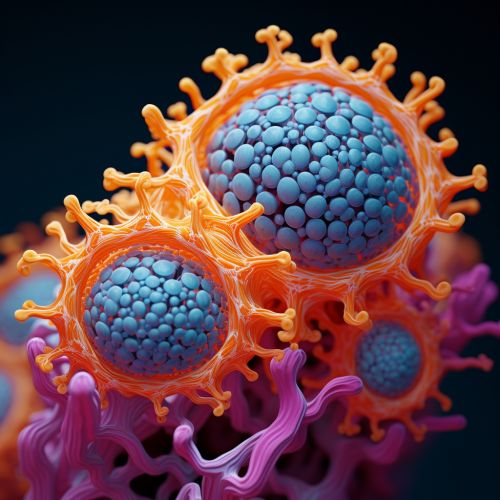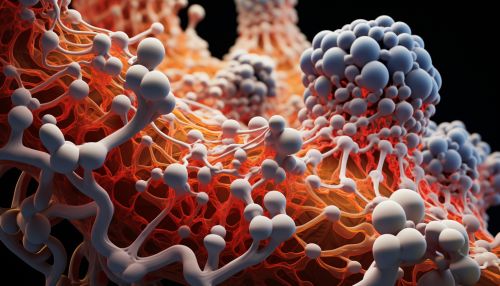Ribosome
Overview
A ribosome is a complex molecular machine found within all living cells that serves the critical function of protein synthesis. Ribosomes are composed of ribosomal RNA (rRNA) and proteins. They are the site of translation, the process that converts genetic information in the form of messenger RNA (mRNA) into proteins.
Structure
Ribosomes consist of two major components: the small ribosomal subunit, which reads the mRNA, and the large subunit, which joins amino acids to form a polypeptide chain. Each subunit comprises one or more molecules of rRNA and a variety of ribosomal proteins. The sequence of DNA, which encodes the sequence of the amino acids in a protein, is copied into a type of RNA called messenger RNA (mRNA). This mRNA is then loaded onto the ribosome and is read by transfer RNA (tRNA), which carries the amino acids.


Function
The function of the ribosome is to synthesize proteins, which are essential for the functioning of the cell. The process of protein synthesis involves decoding the mRNA to produce a specific protein molecule. This process is known as translation. During translation, the ribosome reads the sequence of the mRNA in groups of three bases to assemble the protein.
Ribosomes in Prokaryotes and Eukaryotes
Ribosomes are present in both prokaryotic and eukaryotic cells, but there are differences in their structure and function. Prokaryotic ribosomes are smaller and have a different protein and RNA content compared to eukaryotic ribosomes. Despite these differences, the basic function of the ribosome is the same in both types of cells - to synthesize proteins.
Ribosome Biogenesis
Ribosome biogenesis is a complex process involving the production and assembly of the ribosomal components. This process takes place in the nucleolus of the cell, where the rRNA is synthesized and combined with proteins to form the ribosomal subunits.
Clinical Significance
Ribosomes have a significant role in human health and disease. Defects in ribosome function can lead to a variety of diseases, including cancer and ribosomopathies, a group of genetic disorders that result from abnormalities in ribosome function.
